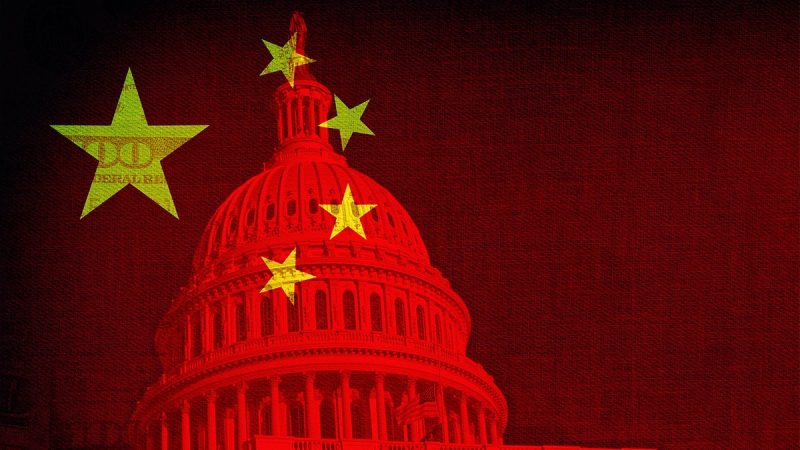
Former national security officials could soon lose their security clearances — or even face lifetime bans from lobbying for foreign adversaries — under a new crackdown from Texas Republicans John Cornyn and August Pfluger.
The three-bill package takes direct aim at Washington’s revolving door, closing the loopholes that have let former officials and power brokers — many with deep knowledge of U.S. defense secrets — quietly push the interests of China, Russia and other hostile regimes inside the U.S. government.
If enacted, the legislation would require the Pentagon to revoke security clearances from former defense officials who lobby for Chinese-owned companies and impose a lifetime ban on any Senate-confirmed official lobbying on behalf of designated adversaries — including China, Russia, Iran and North Korea.
A third measure — the PAID OFF Act (Preventing Adversary Influence, Disinformation and Obscured Foreign Financing Act) — would overhaul the Foreign Agents Registration Act (FARA) by eliminating the ‘commercial’ and Lobbying Disclosure Act (LDA) exemptions for entities tied to countries of concern. That change would force anyone representing or advocating for companies substantially owned or controlled by adversary governments, such as China or Russia, to register publicly as foreign agents and would expand the Justice Department’s enforcement authority to pursue unregistered influence campaigns.
The new bills aim to tighten lobbying restrictions amid a growing list of former officials and politically connected figures who have leveraged their Washington access to benefit foreign governments and corporations with minimal disclosure.
The effort marks the full bicameral rollout of the Cornyn-Pfluger package. Cornyn introduced the PAID OFF and CLEAR Path Acts earlier this year in the Senate and is introducing the REVOKE Act today, while Pfluger is introducing all three bills in the House.
The legislation has bipartisan consensus: Sen. Sheldon Whitehouse, D-R.I., is the Democratic Senate co-lead on each measure, while Rep. Jason Crow, D-Colo., is co-sponsoring the CLEAR Path and PAID Off Acts, while Rep. Don Davis, D-Ill., is co-sponsoring the REVOKE Act.
The REVOKE Act was included in the House-passed National Defense Authorization Act, and the PAID OFF Act was included in the Senate-passed version, giving key parts of the proposal bipartisan traction in both chambers.
From the Pentagon’s E-ring to K Street boardrooms, a generation of former officials has turned national security experience into private contracts with foreign-linked companies.
The same revolving door extended into the legal world. President Barack Obama’s Attorney General Loretta Lynch, now a partner at a major Washington firm, represented DJI Technology, the Chinese drone manufacturer later labeled by the Pentagon as a ‘Chinese military company.’ In 2023, she wrote to the War Department urging DJI’s removal from that list and led litigation challenging the designation before the company changed counsel in December.
DJI’s influence campaign in Washington reached far beyond Lynch’s firm. Jeff Denham, a former Republican congressman and Air Force veteran, was among the lobbyists listed on K&L Gates’s 2020 filings for DJI, focused on defense and commerce issues.
John P. Flynn, a former Air Force officer and deputy assistant secretary of the Air Force for legislative liaison, also appeared on Squire Patton Boggs’s lobbying disclosures for the company in 2022 and 2023. Their paths from military and congressional service to representing a Chinese defense-linked firm show how deeply the revolving door runs — and how easily government experience in the national security realm can become a global commodity once officials enter the private sector.
That network extended to Barry Rhoads, the chairman of Cassidy & Associates, one of Washington’s most established defense lobbying firms. A former Army JAG officer and counsel to the House Appropriations Committee’s Defense Subcommittee, Rhoads was listed among the lobbyists who represented DJI between 2018 and 2022. His decades of Capitol Hill and Pentagon experience made him a sought-after adviser for defense contractors — and, under current law, even for companies tied to U.S. adversaries.
In another high-profile example, former Defense Secretary William S. Cohen once worked with Huawei Technologies, the Chinese telecom company later deemed a U.S. national security risk. After leaving the Pentagon, Cohen founded The Cohen Group, which advised Huawei in 2010.
A spokesperson for the firm told Fox News Digital the work was done ‘with the support of the Department of Defense and Director of National Intelligence’ and was meant to limit Huawei’s business in the U.S. to activities acceptable to the U.S. government. The firm said it helped draft a plan that would have restricted Huawei’s sales under a national security agreement, but ended the project when the company ‘decided to take a different path.’
U.S. intelligence agencies have since warned that Huawei’s technology could be used by Beijing for espionage, prompting limits on its access to American networks and suppliers.
Lynch, Flynn, Denham and Rhoads did not respond to requests for comment.
The pattern has not been limited to defense insiders. Hunter Biden, who has faced a years-long Justice Department investigation into his foreign business dealings, including work for a Romanian real estate tycoon and his position on the board of the Ukrainian energy company Burisma Holdings, has also drawn scrutiny from congressional investigators.
They have examined his contacts with businessmen linked to Russian and Chinese interests during the same period. No charges have been filed under the Foreign Agents Registration Act, but the probe has drawn attention to how politically connected figures can pursue lucrative overseas ventures that blur the line between private consulting and foreign influence.
‘It is the bare minimum expectation that U.S. government employees work for the betterment of America, both during their service and long after it. Yet far too often, we see individuals leave government only to lobby on behalf of foreign adversaries who wish to see America fail,’ said Pfluger in a statement. ‘This is a dangerous flaw in the incentive structure for those serving at the highest levels of government.’
‘American policy should not in any way reflect the handiwork of foreign adversaries who are actively working to tip the scales in their favor and undermine our interests,’ said Cornyn.
